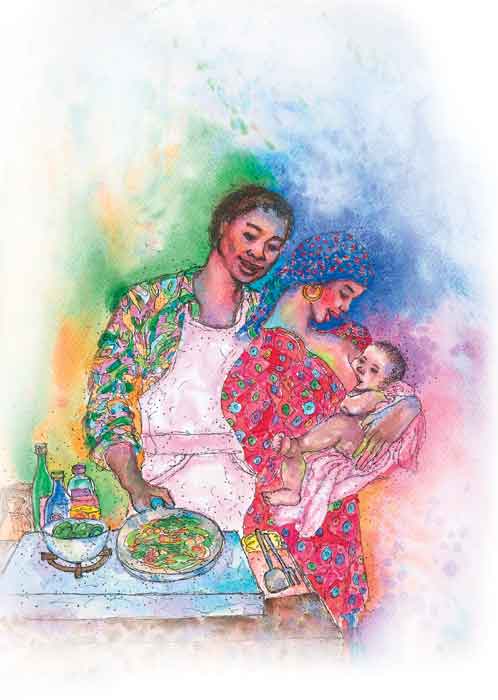Towards a Common Advocacy Agenda
Statement made at the Second WABA Global Forum in Arusha, Tanzania,
23-27 September 2002, based on the four workshops on
Theme 7 - Outreach to Women's Groups. Breastfeeding is a basic human right and it is agreed that the protection of women's right to breastfeed is a shared position of the women's movement and breastfeeding movement. Women can fully exercise this right only where there exists a gender equal social and political environment, whereby women's contribution to productive and reproductive work, including nurturing, is recognised, and where all forms of breastfeeding support can be made available. Gender equity is therefore basic to the breastfeeding movement.
The breastfeeding movement also recognises:
 That breastfeeding support requires changes in all social environments and policies. That breastfeeding support requires changes in all social environments and policies.
 That social transformation needs to take place at all levels to bring about gender equality. That social transformation needs to take place at all levels to bring about gender equality.
 Women's right to life and survival. Women's right to life and survival.
 Women's right to choose free of commercial, medical and political pressure. Women's right to choose free of commercial, medical and political pressure.
 Women's right to food, irrespective of race, class, caste, religion, region and age. Women's right to food, irrespective of race, class, caste, religion, region and age.
Demands Women's groups and breastfeeding groups have decided to put on their advocacy agenda the following demands:
 To recognise the common concern of the adverse effect of globalisation and privatisation on health care services, and the increasing feminisation of poverty. To recognise the common concern of the adverse effect of globalisation and privatisation on health care services, and the increasing feminisation of poverty.
 Women's right to accessible, affordable, comprehensive, high quality and gender - sensitive women's health services. Women's right to accessible, affordable, comprehensive, high quality and gender - sensitive women's health services.
 Women's right to breastfeeding based on informed choices, free of commercial, medical and political pressure. Women's right to breastfeeding based on informed choices, free of commercial, medical and political pressure.
 Social recognition and value of women's work at home as caregivers and nurturers. Social recognition and value of women's work at home as caregivers and nurturers.
 Implementation of maternity protection for women at paid work in the formal and informal sectors. Implementation of maternity protection for women at paid work in the formal and informal sectors.
 Women's right to food, adequate nutrition, rest, safe water and shelter. Women's right to food, adequate nutrition, rest, safe water and shelter.
|



